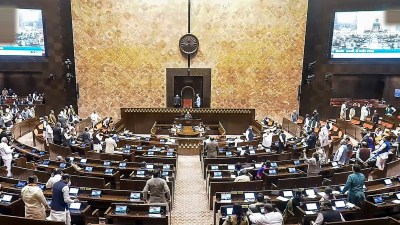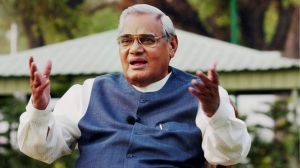The Congress that was confident of returning to power in Haryana by ousting the BJP government after a decade was dealt a blow Tuesday as the BJP clinched the Assembly polls, pulling off a hat-trick in the state.
The BJP won 48 seats out of 90 as against the Congress’s 37, proving exit polls wrong. This caused a major setback to the Congress which was rejoicing at its performance in Haryana in the Lok Sabha elections — it won five of the 10 Lok Sabha seats as compared to the BJP’s five — and was massively confident of wresting the state from the BJP.

With the results marking an anti-climax for the Congress, there is significant unease in the party. A blame game has started and knives are already out. The party would now be back to the drawing board. And there are many questions to be answered: was it politically wise to put all the eggs in Leader of Opposition Bhupinder Singh Hooda’s basket, how did the open tug of war between Hooda and party MP Kumari Selja for the Chief Minister’s post play out, were there lacunae in the selection of candidates – Hooda’s detractors have been claiming that he cornered a lion’s share of the tickets – and was the party overconfident and complacent?
And what will be the immediate implication? The narrative of a Congress revival that it assiduously built after the Lok Sabha elections will be punctured. And what about the impact of Rahul Gandhi who campaigned extensively in the state, taking out a yatra in Haryana in the last week of campaigning? Had it swept to a victory, the party was expected to give all the credit for a victory to Gandhi.
The BJP retained power in a state where it was said to have faced massive anti-incumbency, farmers’ wrath and wrestlers’ protests. Here are some of the factors that seemed to have sealed the Congress’s fate in the Haryana polls.
Overdependence on Jat vote
The Congress relied heavily on Jat voters, who comprise almost 27% of the state’s electorate. Among the Jat-dominated seats, the Congress led in Kaithal, Baroda, Julana, Tohana, Ellenabad, Narnaund, Meham, Garhi Sampla-Kiloi, Badli and Jhajjar, but several other such seats like Panipat Rural, Sonipat, Gohana and Badhra voted in the BJP’s favour.
The Muslim vote bank, however, remained firmly behind the Congress. Its Ferozepur Jhirka candidate, Mamman Khan, won by a huge majority of 98,441 votes while two other Muslim-dominated seats of Nuh and Punahana were also bagged by the party.
Story continues below this ad
Infighting hurts Cong
Internal feuds, especially the one between Dalit leader Selja and Jat leader and former CM Hooda, seem to have played a key role in the party’s loss.
Selja, who was miffed with the party for preferring Hooda’s candidates, stayed away from the final stages of the campaign for a few days and had to be pacified into resuming it. Moreover, she repeatedly staked claim to the CM’s chair, exposing the rift in the party.
This provided ammunition to the BJP, which accused the Congress of being anti-Dalit. It also gave the BJP an opportunity to claim that unlike the party, which went into the election under the leadership of CM Nayab Singh Saini, the Congress had no clarity on the CM face. With Saini belonging to the OBC community, the BJP consolidated the non-Jat vote bank in its favour.
A Congress leader said, “The election became a Jat versus non-Jat affair. But we turned a blind eye. Hooda secured tickets for 72 of his supporters. It created an impression that he is going to be the CM. It was the duty of the party leadership to create a perception that the race was open and anyone, including Selja, could become the CM,”
Story continues below this ad
Another party leader said, “There was a huge sentiment in non-Jat sections against a Jat becoming the CM. The mood was more pronounced in the Ahirwal belt.”
He also said, “The Hooda camp, of course, wanted to sideline and corner Selja. That is why stories were deliberately planted that she got a raw deal in selection of candidates.” The party gave 28 tickets to Jats which deepened the perception that Hooda had his way and was set to become the CM.
Overconfidence
Following its improved performance in the recent Lok Sabha elections, the Congress leaders became more aggressive.
Relying heavily on the farmers’ protest, wrestlers’ protests, the Agnipath scheme and buoyed by the 15% rise in vote share in the Lok Sabha polls, the Congress’ campaign revolved only around these issues but failed to translate into votes for the party.
Story continues below this ad
“They (Haryana Congress) were so overconfident that no efforts were made to pacify rebels in many seats. Our candidates in Sonipat, Mahendragarh and Samalkha were facing corruption charges. Our Sonipat candidate Surender Panwar contested from jail,” a party leader said.
Faulty tickets & organisational mismanagement
Accusing Hooda of “handpicking” 72 of the Congress’s nominees, his party rivals complained to the party high command that loyal workers and supporters felt betrayed due to the lopsided candidate selection.
“In at least three seats that the party lost, there were rebels who were Hooda’s loyalists. In Ballabgarh, the rebel candidate was a Hooda loyalist. While the Congress candidate Parag Sharma got 8,000-plus votes, rebel Sharda Rathore secured over 44,000 votes and came second. In Tigaon, the Congress candidate Rohit Nagar was pushed to the third spot by Congress rebel Lalit Nagar, who came second. He was also said to be a Hooda loyalist. Same is the case in Bhawan- Khera seat. All the three official party candidates were nominees of the high command,” a party leader said.
What Cong was hoping for?
The Congress, which was relegated to the third position in the 2014 Assembly polls, winning 15 seats with a 20.7% vote share, bounced back in 2019 bagging 31 seats. In the recent Lok Sabha elections, the party further improved its position. Extrapolated to the Assembly seats, that meant the Congress leading in 42 as against the BJP’s 46. The hope in the Congress camp was for further improvement.
Story continues below this ad
According to the results in the current Assembly polls, the Congress, which had got 28.08% vote share in 2019, garnered 39.09% votes. The BJP, which had garnered 36.49% vote share and 40 seats in 2019, got 39.94% votes.
Since the winter of 2018, the Congress has not won a single Assembly election in Northern India barring the hill state of Himachal Pradesh in 2022. A victory in Haryana no doubt would have added spring to its step, allowing it to approach the upcoming elections in Maharashtra and Jharkhand on a stronger footing.
The Congress, along with the Opposition INDIA bloc, was hoping to send out several political messages. It hoped a victory in Haryana would have strengthened the narrative that the BJP was losing its grip in parts of North India, the first glimpse of which was seen in the Lok Sabha elections six months ago when it lost seats in states such as Uttar Pradesh, Rajasthan, Haryana, and Bihar while retaining its ground in Madhya Pradesh, Chhattisgarh, Himachal Pradesh, and Uttarakhand. Consequently, the BJP’s tally came down from a dominant 303 to 240.
Since Narendra Modi’s ascent in national politics in 2014, India has seen an unquestioned single-party dominance of the BJP. While the ruling party still retains its dominant position at the centre of Indian politics, the Congress hoped a victory in Haryana would be the first indication that the country’s electoral politics is returning, albeit slowly, to the conventional balance, where “parties win some and lose some”. But now, the Congress appears to have snatched a defeat from the jaws of victory in Haryana.

































